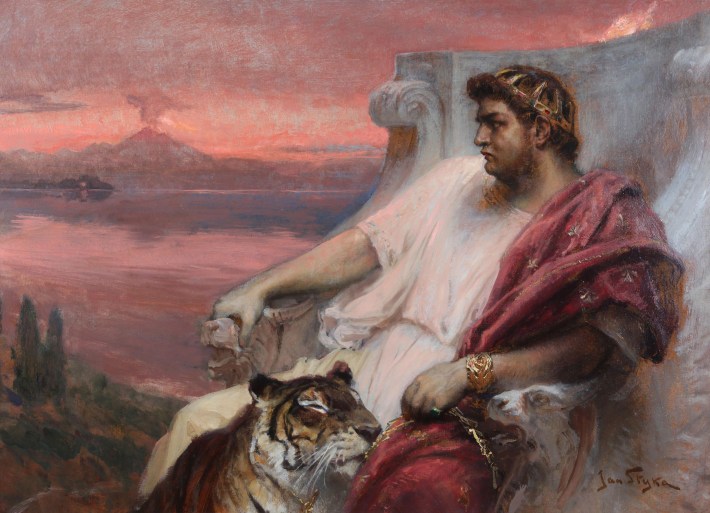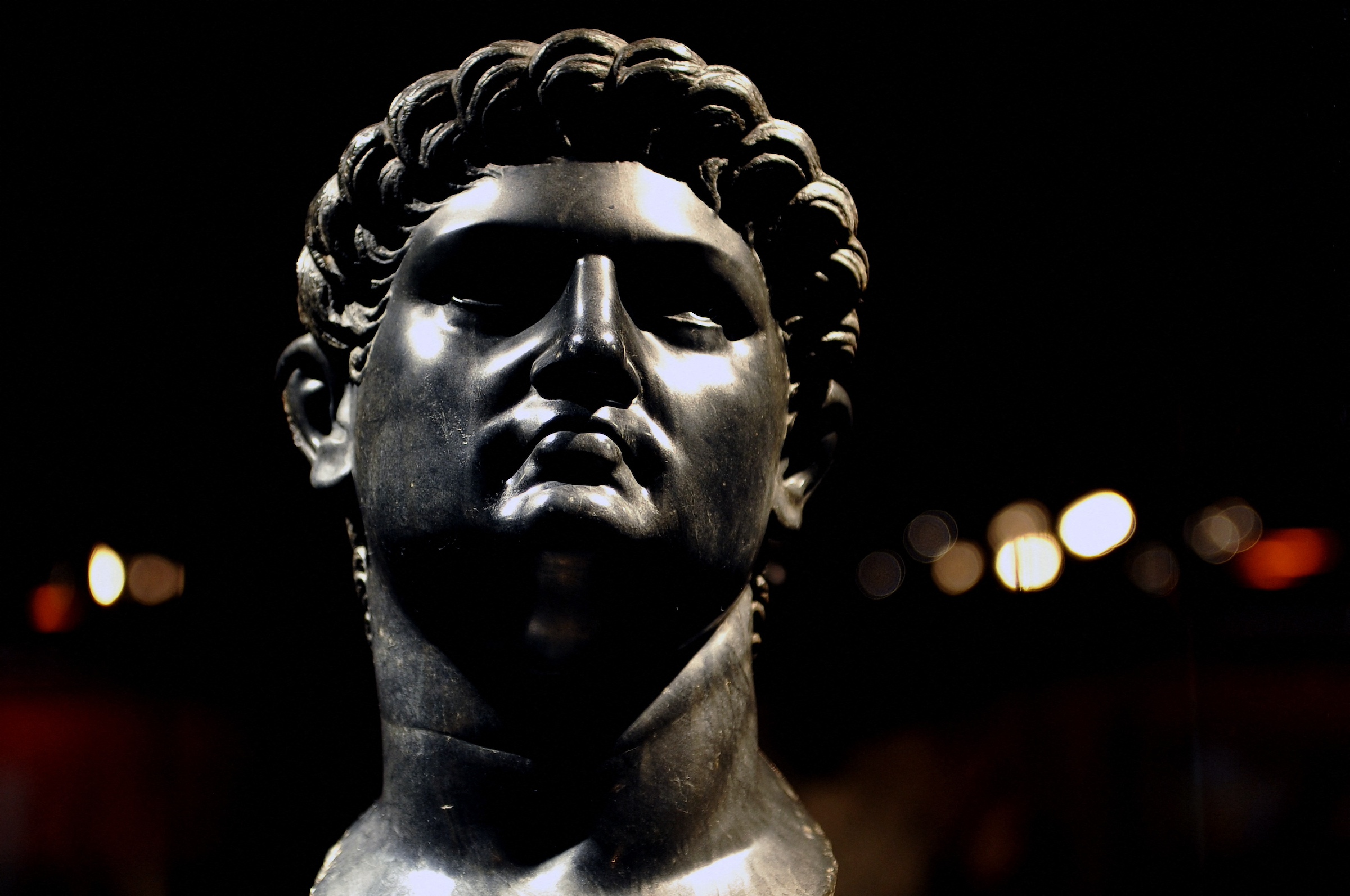Oh, you think you're into the Olympics? You're flipping back and forth between USA and E! for 14 uninterrupted hours a day? You're locked in on Gold Zone quadbox? Don't make me laugh. You have the Olympic enthusiasm of a child compared to the Roman Emperor Nero, who loved the Games so much he forced the Greeks to hold them in an off-year and invent new sports so he could compete. And win. Oh, did he ever win.
Nero Claudius Caesar Augustus Germanicus became the heir when his mother Agrippina married the Emperor Claudius, persuading him to adopt young Nero. He took the throne when his mother (probably) poisoned Claudius when Nero was 17 years old, making him one of the empire's premier nepo babies (though perhaps not as blatantly as the West's last emperor, Julius Nepos, who was quite literally named for it; just a little Latin humor for you, ha ha). Nero was initially popular with the common people because he liked the same things they did—musical performances, chariot races, theater—and highly unpopular with the upper classes for his taxation of them to fund his various entertainments. He might have been fine if he'd left it there. But Nero didn't just want to watch. He wanted to compete.
A note here on historiography: Because Nero's reign proved so controversial, there are no objective accounts of it. There are no surviving contemporary histories, period, and though later historians did reference before they were lost, even they note how polemical the accounts were. Not to say that Nero was a good dude; he absolutely was not. It's just that almost everything we know about him comes down to us from someone who hated his guts, and may be embellished or even invented. He almost surely did not fiddle while Rome burned, for example. Thus while it's hard to say anything certain about him, the histories do all agree on one fact: The sumbitch had Olympic Fever.
Rome, which completed its hegemony over Greece in 146 B.C.E. with the battle of Corinth, let traditional Greek cultural and religious festivals continue. One of the biggest was the Olympic Games, which featured both athletic and artistic competitions and, then as now, were held every four years. But Nero could not get away from business in Rome, so he pulled some strings. He had them delay the scheduled Olympics of 65 C.E. for two full years, until he could travel to Greece to take part. Even then, when an advisor begged him to return quickly because someone needed to run the Empire, Nero's response was more or less: Don't worry about the Empire. Worry about me winning gold.
To avoid being distracted or hindered in any way while busy with these contests, he replied to his freedman Helius, who reminded him that the affairs of the city required his presence, in these words: "However much it may be your advice and your wish that I should return speedily, yet you ought rather to counsel me and to hope that I may return worthy of Nero."
In 67 C.E., at age 30 and with a single-minded competitiveness worthy of Katie Ledecky, Nero never missed a chance to better his odds. He flattered his competitors, we are told, though the best among them he simply bribed to take a dive. He bought off judges. He invented a new Olympic competition for lyre-playing, because he thought he was good at it. He won gold after gold (the ancient Games actually awarded crowns to winners at this point in their history, and before that olive wreaths; I use "gold" symbolically here). He forced audiences to remain seated for his performances, which, Suetonius tells us, led to some slapstick scenes:
While he was singing no one was allowed to leave the theatre even for the most urgent reasons. And so it is said that some women gave birth to children there, while many who were worn out with listening and applauding, secretly leaped from the wall, since the gates at the entrance were closed, or feigned death and were carried out as if for burial.
But Nero's crowning Olympic moment came in the chariot race, the festival's premier event. The chariot was always a four-horse quadriga, which had been the standard for nearly 750 years, since the Olympics of 680 B.C.E. But Nero didn't want to race a four-horse chariot. He wanted to race a 10-horse chariot. So, because he was Nero, he was allowed 10 horses, even though all the other competitors still had four.
But 10 horses can be tough to handle, and Nero overturned his chariot on the first turn. He was lightly injured, and though he attempted to continue the race, he had to withdraw before the finish. So: Everyone else finished before him, and he didn't finish at all, and also he had six more horses than everyone else. He was named the winner.
Afterward, as Cassius Dio tells us, he just happened to gift the race judges a million sesterces and Roman citizenship. Out of the goodness of his heart, I imagine.

When it was all said and done, Nero had "won" the quadriga race, the 10-horse chariot race, the chariot race for foals, the competition for heralds, for lyre-playing, for tragedy, and for one event not recorded. Everyone else at the Olympics of 67 C.E. won two events, combined. That was still too many for a world-champion hater's liking. Suetonius: "To obliterate the memory of all other victors in games and leave no trace of them, their statues and busts were all thrown down by his order, dragged off with hooks, and cast into privies."
Nero's record of seven golds at a single Games wouldn't be equaled until Mark Spitz in 1972, and wasn't surpassed until Michael Phelps won eight in 2008. His record for most individual golds at a single Olympics still stands.
He still wasn't done. There were other Panhellenic festivals in which to compete, and win. Before he returned to Rome, Nero swept the Isthmian Games, the Pythian Games, the Nemean Games, the Actian Games. I could go on. "He not only won at competitions in which he took part, but even in those in which he did not." What a champion! By the end of his career, he had won about 1,800 prizes in various festivals.
That career ended prematurely with Nero's forced suicide the year after his Olympic triumphs, as he failed to put down a revolt against his tax policies. But many of the working classes of the Empire still thought fondly of him, and supported a series of impostors claiming to be Nero in attempts to gain the throne. Cults believing in a return of Nero continued long after his realistic lifespan, and took on messianic and eschatological overtones: In 422 C.E. Augustine of Hippo wrote of Christians who believed that Nero would return as the antichrist.
I don't believe that. I believe that if Nero were to be reborn, it'd more likely be as a three-point specialist in 3x3 hoops, to try to get his Olympic records back.






